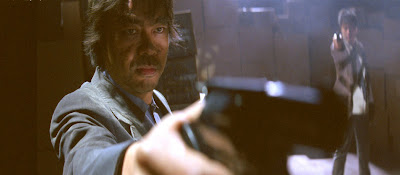Leave it to Johnnie To and his great collaborator Wai Ka-fai to breathe new life into that most shopworn and exhausted of genres: the police detective story. Mad Detective was a cast and crew reunion of sorts, To and Wai’s first co-directed feature since 2003’s Running on Karma, and Mad Detective indulges in a similar cockeyed mysticism to that earlier one. Also, erstwhile To stalwart Lau Ching-wan returned to the Milkyway Image (To’s production company) family after several years’ absence, in the complex central role as the titular crazy cop. Bun (Lau) is a detective whose working methods are, shall we say, more than a bit unusual. In a pre-credits sequence, he solves a murder and mutilation case by having another cop stuff him in a suitcase and throw him down several flights of stairs to simulate how the victim met their demise. He emerges and correctly fingers the murderer. As strange as this is, Bun’s true madness is revealed in a jaw-dropping scene that occurs shortly afterward. At a superior’s retirement celebration, Bun proudly cuts off his own ear and offers it as a going away present. And this film’s patented weirdness continues from there.
Bun’s self-mutilation is disturbing enough to his superiors that he is forced to quit the force. Five years later, his erstwhile partner Ho Ka-on (Andy On), enlists his help in an internal investigation involving Ko Chi-wai (Lam Ka-tung), whose partner disappeared in the woods on a case, and who is suspected of his partner’s murder. The film’s central conceit, rendered in both narrative and visual terms, is that Bun supposedly sees beyond the surface of people to their “inner personalities,” which are shown on screen as alternate personages seen through Bun’s eyes. Bun believes Ko has seven multiple personalities, all of which appear in clusters where everyone else, including the increasingly skeptical Ho, only sees one. This device, used repeatedly throughout the film, serves to throw us off-balance, and we are never able to fully trust what we see. It takes a while for us to realize, for example, that Bun’s wife May (To regular Kelly Lin), whom we first see strenuously objecting to his resumption of police work, is in fact a figment of his imagination. We eventually become as disoriented as the film’s protagonist as we witness his ever more bizarre and puzzling actions. Throughout, the overarching question remains: is Bun crazy like a fox, or just plain crazy?
As usual with Johnnie To, there is style to burn all through the film, especially in the climactic hall-of-mirrors shootout sequence. And although there are some serious lapses in internal logic, and exactly how Bun is able to come to his amazingly intuitive deductions is left disappointingly unclear, To and Wai deliver a satisfyingly challenging metaphysical gumshoe thriller.





